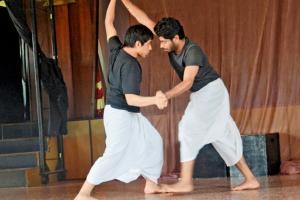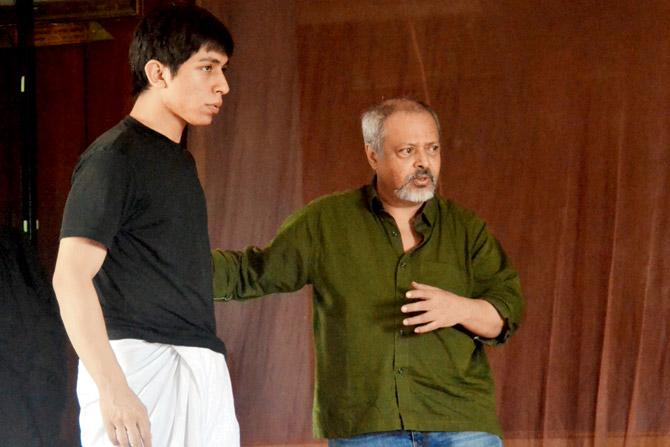A student production of the Hindi translation of Taledanda marks the first time Sunil Shanbag directs a Girish Karnad play. The theatre veterans on why history is crucial to decipher the present

It was as a 16-year-old schoolboy that Sunil Shanbag first watched a Girish Karnad play. "It was [Satyadev] Dubey's production of his play Hayavadana at the Tejpal Auditorium in Gowalia Tank. And I was completely blown away. It made me decide to do theatre for the rest of my life," he recalls. Over 45 years later, in a full circle of sorts, Shanbag has directed a Karnad play for the first time, for the annual student production of Drama School Mumbai.
ADVERTISEMENT

The play's cast includes 16 students
Set in the 12th century, Rakt Kalyan is Ram Gopal Bajaj's Hindi translation of the classic Taledanda. Karnad wrote it in 1989 in the backdrop of the Mandir-Mandal conflict. It is based on the consequences of an 800-year-old incident during the Bhakti movement period, when a congregation of poets, mystics, social revolutionaries and philosophers who opposed idolatry, upheld equality of sexes, and rejected the caste system, acting on their beliefs. "Between the time it was written and today, the debate around caste has grown and become far more sophisticated from the point of view of the Bahujans. In the wake of recent events in Maharashtra and other parts of the country, I felt it was important to revisit this play because it asks some very fundamental questions, and sometimes, it is important to go back to those fundamental positions," explains Shanbag, who dedicated two weeks to research, so that the students could appreciate the context of the play.

Sunil Shanbag with a student
The play, then, is more than a coing together of two creative processes. For, history has been a common theme of engagement for both theatre veterans. "For me, of all Karnad's works, his historical plays have been extremely powerful. Whether it's Taledanda, or Tughlaq — one of the finest plays written in the country — his ability to look at history is such that it becomes completely relevant to our times. He says somewhere that to understand the present, you have to understand the past. That has stayed with me," says Shanbag, who was a co-author for the iconic historical drama series, Bharat Ek Khoj.

Girish Karnad
In fact, relevance is what Karnad deems necessary for the success of a political play. "Those plays which are very contemporary but are forgotten a few years later are not political plays. Political plays talk about much more than a political event; they talk about the forces that shape it. After all, we still do Hamlet or Mother Courage. I have an offer now to translate my play Tughlaq into Iranian. Now, why is that? Because it makes sense in Iran today. So, I take it as a compliment that Taledanda, which was written 30 years ago in another context, has come to the stage again," he tells us over a phone call from Bengaluru.
After its run in Mumbai, the play will travel to Bengaluru. And the prospect of having Karnad in the audience, Shanbag tells us, is an exciting one for him and the students. "Of course, I would love to watch it. Shanbag is a brilliant and committed director," Karnad shares, and then, like a true theatrewallah, adds, "But there is only one show here and Ranga Shankara has only 200 seats. So, if it's full, I would rather that someone else watches the show instead of me seeing it again."
ON Tonight, 7.30 pm
AT G5A Foundation for Contemporary Culture, Mahalaxmi
Log on to bookmyshow.com
Entry Rs 200
Catch up on all the latest Crime, National, International and Hatke news here. Also download the new mid-day Android and iOS apps to get latest updates
 Subscribe today by clicking the link and stay updated with the latest news!" Click here!
Subscribe today by clicking the link and stay updated with the latest news!" Click here!






